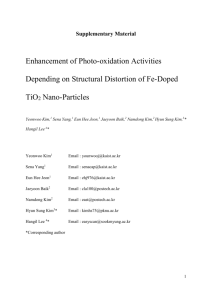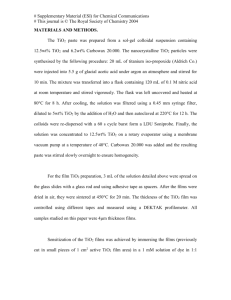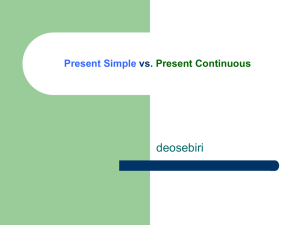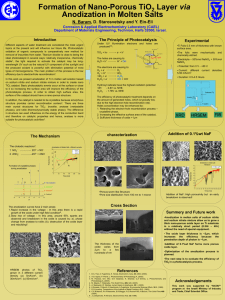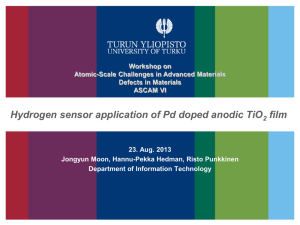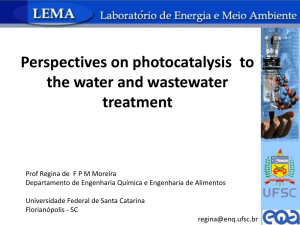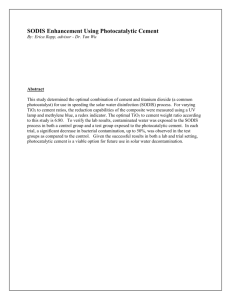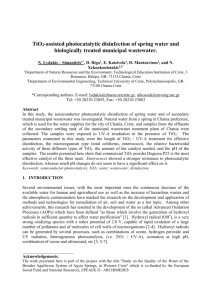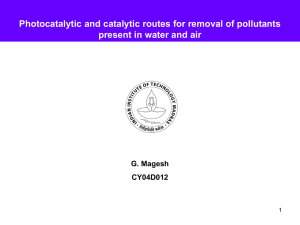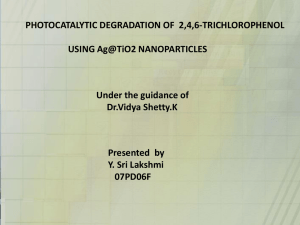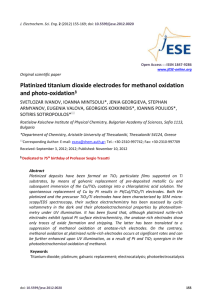`TiO2`, GREEN CATALYST: CLEAN ENVIRONMENT
advertisement
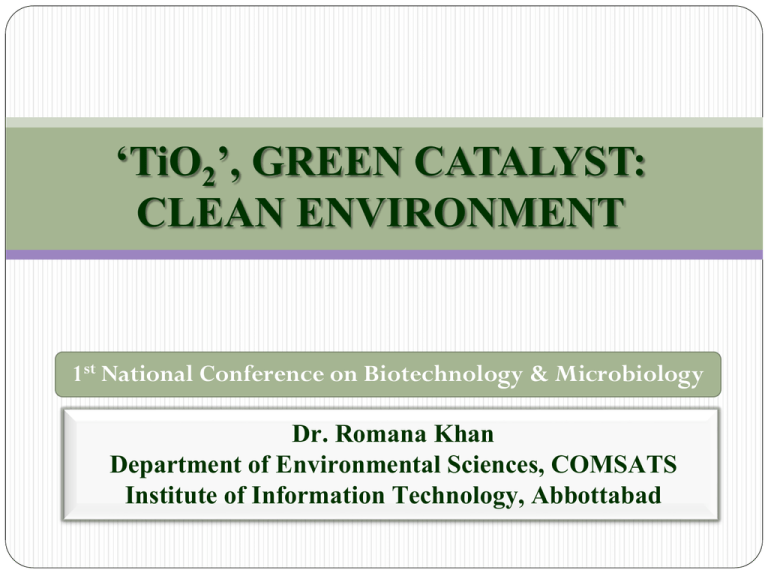
‘TiO2’, GREEN CATALYST: CLEAN ENVIRONMENT 1st National Conference on Biotechnology & Microbiology Dr. Romana Khan Department of Environmental Sciences, COMSATS Institute of Information Technology, Abbottabad Introduction Photocatalysis - Need of the day Photocatalysis CO2 + H2O CO2 Chlorophyll Photocatalyst Organic Compound H2O Starch + O2 Organic compound + H2O + O2 Photocatalytic Applications Antimicrobial Effect Antimicrobial Effect Self-Cleaning Effect Photocatalysts TiO2 – an Ideal Photocatalyst Cheap and can be reused High photo-chemical corrosive resistance Strong oxidizing power Photocatalysis takes place at ambient temperature Atmospheric oxygen is used for the reaction TiO2 - Photocatalysis 3.12 eV (380 nm) Redox potential of h+ 1. The redox potential for photogenerated h+ is +2.53 V vs. the SHE 2. After reaction with water, these h+ can produce •OH 3. Both h+ and •OH are more positive compare to ozone Photocatalytic Reactions TiO2 + h h+ + H2O O2 + eO2 - + H+ HO2 + HO2 O2 - + HO2 TiO2 (e- + h+) OH + H+ O2 - HO2 H2O2 + O2 O2 + HO2- HO2- + H2O2 H2O2 + h 2 OH H2O2 + O2 - H2O2 + e- HO + OH- + O2 HO + OH- Entail Physicochemical Properties of TiO2 The applications of TiO2 is a function of specific physicochemical properties like: High Surface area Small Crystalline Size Anatase form of TiO2 High crystallinity Porous structure Activation light source An appropriate synthetic procedure can provide TiO2 with promising efficiency Synthesis of TiO2 Powders Synthesis of TiO2 powders Sulfate Method Chloride Method Specific Methods Sol-Gel Method Hydrolysis and Condensation Sol-Gel Technology Visible-Light Active Photocatalyst TiO2 – efficient photocatalyst under UV light Yet, need visible-light active photocatalyst for practical purpose Can be achieved by doping TiO2 with nonmetals, transition metals and dyes Activity increases by loading a metal oxide Metal oxide reduces the chance of recombination of electrons & holes produced during photocatalytic reactions Modification of TiO2 e- e- e- TM-TiO2 TiO2 NM-TiO2 h+ h+ h+ Coating Techniques A- Spin Coating Method B- Dip Coating Method C-Spray Coating Method D- Sputtering Method Setting Substrates Vacuuming Coating / Discharging plasma Collecting Substrates E- Plate Coating An Acid-Base Catalyzed Sol-Gel Synthesis of TiO2 Photocatalysts Ti(OBu)4 + EtOH HCl + H2O + EtOH Stirring (12 h) Sol (pH 0.8) Stirring (12 h) NH4OH Gel (pH 9.0 ) Drying (1100C, 12 h) Calcination Phase Structure and Thermal Stability (f) Intensity (a.u.) (e) (d) (c) (b) (a) 20 30 40 2 50 60 70 XRD patterns of TiO2 samples; (a) as-dried, and calcined at (b) 350 oC, (c) 400 oC, (d) 500 oC, (e) 600 oC and (f) 800 oC. 80 Some Selected Properties of TiO2 Powders Catalyst Crystal Phasea Size of A(nm)b SBET(m2/g) c V(cm3/g)d DBJH(nm)e P-25 A:R (75:25) 25 50 - - T-as dried A 4.3 331 0.21 2.4 T-350 A 9 102 0.18 5.2 T-400 A 11 83 0.16 5.2 T-500 A 18 63 0.12 8.1 T-600 A: R (98: 2) 29.6 27 0.08 12.5 T-800 A: R (5:95) 45.5 1.9 0.007 3.4 Photocatalytic Efficiency -5 Concentration (6.6 x 10 mole) 7 6 5 4 3 2 1 0 0 30 60 90 120 150 180 Time (min) Catalytic degradation of toluene by different TiO2 samples; (a)Blank (■)(b)TiO2 – as-dried (●); (c) P-25 (▲); and TiO2 calcined at (d) 350 oC (▼); (e) 400 oC () (f) 500 oC (◄ ); (g) 600 oC (►). Photoreactor Publications 1. Romana Khan, S.W. Kim, T.J. Kim, H.S. Lee – A novel acid-base catalyzed sol-gel synthesis of highly active mesoporous TiO2 photocatalysts, Bulletin of the Korean Chemical Society, 28(11), 1951-1957 (2007). 2. Romana Khan, S.W. Kim, T.J. Kim – Synthesis and control of physical properties of titania nanoparticles as a function of synthetic parameters, Journal of Nanoscience and Nanotechnology, 8(9), 4738-4742 (2008). 3. Romana Khan, S.W. Kim, T.J. Kim, C.M. Nam – Comparative study of the photocatalytic performance of boron– iron co-doped and boron-doped TiO2 nanoparticles, Materials Chemistry and Physics, 112(1), 167-172 (2008). 4. Romana Khan, S.W. Kim, T.J. Kim, C.M. Nam – Comparative study of the photocatalytic performance of boron– iron co-doped and boron-doped TiO2 nanoparticles, Materials Chemistry and Physics, 112(1), 167-172 (2008). 5. Romana Khan, T.J. Kim – Preparation and application of visible-light responsive Ni-doped and SnO2-coupled TiO2 nanocomposite photocatalysts, Journal of Hazardous Materials, 163(2-3), 1179-1184 (2009). Thank You
